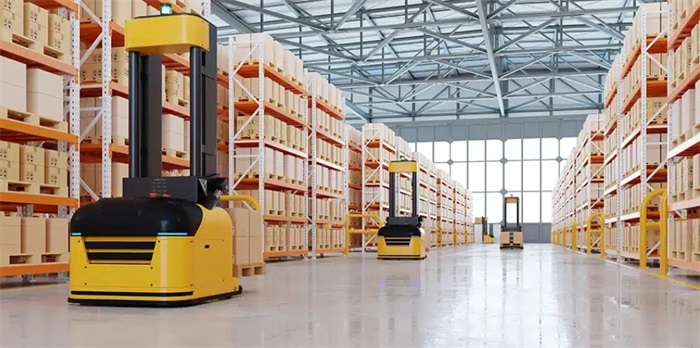AGV Positive Batterys (AGV Lithium Batteries) : A Premium Battery Choice For Autonomous Vehicles

AGV (Automated Guided Vehicle) is an automation transportation tool that navigates along predefined paths using magnetic strips, tracks, or lasers. In modern automated logistics and industrial production, AGV has become a widely used material handling tool in warehouses, production lines, and distribution centers. The power system of AGV—the battery—plays a crucial role in the vehicle’s performance and efficiency. Specifically designed for AGVs, it provides the necessary energy for their operation.
With technological advancements, the types of AGV batteries have diversified. Among them, AGV positive batteries (usually referring to AGVs powered by lithium batteries) and traditional AGV batteries (typically lead-acid batteries) are the most common choices in the market. While both battery types have their own characteristics, AGV positive batteries, especially lithium iron phosphate (LiFePO₄) batteries, have many unique advantages over traditional lead-acid batteries in terms of operational efficiency, long-term usage, and low maintenance costs.
From theoretical analysis to practical application, we can delve into various dimensions to compare AGV positive batteries with traditional AGV batteries and discuss how customers should make a trade-off when selecting a battery.
Energy Density and Endurance
One of the most significant advantages of AGV positive batteries is their high energy density. Lithium batteries, such as those using lithium iron phosphate (LiFePO₄) or nickel-cobalt-aluminum (NCA) cathode materials, offer higher energy storage density compared to traditional lead-acid batteries. In the same volume and weight, lithium batteries can store more energy, providing AGVs with longer operational times.
For instance, an AGV using a lead-acid battery may require frequent recharging, and the energy gained per charge is relatively limited. On the other hand, an AGV using a lithium battery can operate for a longer period on a single charge, reducing downtime and improving overall operational efficiency. For example, in large logistics centers, AGVs with lithium iron phosphate batteries can operate for up to 8 hours without needing a recharge, whereas lead-acid battery-powered AGVs typically only provide 4-6 hours of continuous operation.
Charging Speed and Operational Efficiency
Another important advantage of lithium batteries is their fast-charging ability. Due to the chemical characteristics of lithium batteries, they can be charged in a relatively short time without causing damage to the battery during rapid charging. In contrast, traditional lead-acid batteries typically take longer to charge and can overheat during charging, reducing battery lifespan. For AGVs that require frequent operation, fast charging means shorter downtime, allowing the vehicles to quickly resume tasks and increase operational efficiency.
For instance, in 24-hour warehouse environments, AGVs with lithium batteries can charge quickly during rest periods, minimizing downtime. In comparison, lead-acid batteries often take several hours to fully charge, which limits the production efficiency of AGVs.
Service Life and Cycle Times
AGV positive batteries, particularly those using lithium iron phosphate technology, have a significantly longer service life. Lithium iron phosphate batteries can provide over 3,000 charge cycles, while lead-acid batteries typically offer between 500 and 1,000 cycles. This means that AGVs using lithium batteries will experience significantly lower battery replacement costs and frequency. In high-usage environments, long-life lithium batteries can help reduce maintenance and replacement costs.
For example, in high-density storage systems, AGVs may need to replace their batteries multiple times each year. Using lithium iron phosphate batteries typically provides a lifespan of 4-6 years, whereas lead-acid batteries may need to be replaced annually, resulting in additional operating costs.
Weight and Space Utilization
Lithium batteries are lighter and more compact than lead-acid batteries. The lightweight nature of AGV positive batteries (lithium batteries) not only reduces the overall weight of the AGV but also allows designers more flexibility in designing AGVs. More space can be utilized for other functions or cargo. Lighter batteries make AGVs more agile during high-speed operations and allow them to complete tasks more efficiently.
For AGVs that handle heavy loads, lithium batteries help reduce the impact of battery weight on the overall load, thereby improving the AGV’s carrying capacity and maneuverability. In contrast, AGVs powered by traditional lead-acid batteries, due to their heavy weight, usually require stronger chassis designs to support the battery, increasing the overall weight and decreasing operational efficiency.
Safety Performance
Safety is a critical factor when selecting AGV batteries. Lithium iron phosphate batteries, as a common choice for AGV positive batteries, are widely used due to their excellent thermal and chemical stability. Even in cases of overcharging or overdischarging, lithium iron phosphate batteries do not undergo violent reactions, making them safer and virtually preventing thermal runaway or fire incidents.
On the other hand, traditional lead-acid batteries may present some safety risks during use. For example, the liquid electrolyte in lead-acid batteries can leak under extreme conditions, causing corrosion or other safety issues. In high-temperature environments, lead-acid batteries may experience gas expansion, overheating, or other risks.
Environmental Impact
Lithium batteries are far more environmentally friendly than lead-acid batteries. Lithium batteries have a lower environmental impact during production and recycling, and key components such as lithium, cobalt, and nickel have higher recycling value. Lead-acid batteries, due to the presence of harmful substances such as lead, can cause environmental pollution if not properly handled. Therefore, from an environmental perspective, choosing AGV positive batteries is a more sustainable option.
As global environmental regulations become stricter, many countries and regions are implementing more rigorous battery recycling policies, and the disposal cost of lead-acid batteries is rising. Meanwhile, lithium batteries have lower recycling costs and a more environmentally friendly recycling process.

Advantages of AGV Positive Batteries (AGV Lithium Batteries)
High Efficiency:
Lithium batteries are more efficient. The energy efficiency of lithium batteries is around 95-98%, while AGM or GEL lead batteries are about 80-85%.
Longer Cycle Life:
For a given discharge depth, lithium batteries ensure more charge cycles, thereby extending the lifespan. If you discharge an AGV battery to 50% of its capacity, SLA (GEL/AGM) batteries typically last around 1,500 charge cycles, while lithium batteries exceed 6,000 cycles.
Deeper Depth of Discharge (DOD):
Lithium batteries can handle 80% DOD while maintaining excellent battery life (over 3,000 cycles). Therefore, using the same 100 Ah battery, you can use 80 Ah, giving your AGV more time to perform tasks instead of wasting charging time.
Fast Charging:
AGM/GEL batteries require about 8-10 hours to charge, while LiFePO₄ batteries offer superior fast-charging capabilities, reaching 90% charge in 1 hour.
Higher Energy Density:
For the same volume, more energy is available. In other words, with the same power, lithium batteries are lighter. Lithium batteries are approximately three times more energy-dense.
Maintenance-Free:
EverExceed lithium batteries are completely maintenance-free and 70% lighter than equivalent lead-acid batteries.
Safety:
Advanced BMS ensures safety under high and low temperatures, overvoltage, undervoltage, overcurrent, and short circuit conditions. It also monitors battery balance, charging status, and voltage. Moreover, the LFP technology used in our batteries offers enhanced fire and explosion protection, while other brands may use NCM, sacrificing safety to lower costs.
Conclusion and Recommendations
From the perspective of overall performance, cost-effectiveness, operational efficiency, and long-term sustainability, AGV positive batteries (especially lithium iron phosphate-lifepo4 batteries) offer significant advantages in modern AGV applications. They provide higher energy density, longer service life, faster charging, lower maintenance costs, and superior safety, making them ideal for enterprises aiming for efficient operations and long-term investment.
However, traditional lead-acid batteries still have certain advantages in some low-budget or less-demanding battery scenarios. For AGV applications with limited budgets, shorter operational cycles, and infrequent charging, lead-acid batteries remain a more economical choice. Their initial investment cost is lower, making them suitable for environments with less frequent battery use.
Ultimately, the choice of battery should be made based on the AGV’s usage scenarios, budget, and long-term operational requirements. If enterprises aim for high-efficiency, long-term operations, and reduced maintenance costs with enhanced safety, opting for AGV positive batteries is undoubtedly a more sensible decision. Energyx's durable, high-performance agv lithium-ion positive batteries extend agv life. Excellent performance, fast charging, and low maintenance costs. You can request a quote now!

